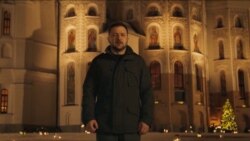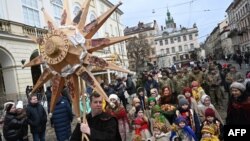In his nightly video address on Christmas Eve, Ukrainian President Volodymyr Zelenskyy said that this Christmas, the second in a row during Ukraine’s defensive war against Russia, the most important element for Ukrainian families, is “not what dishes are on the table, but what people are at the table. And how precious it is to have them around.”
Zelenskyy remarked that Ukrainians’ values and wishes have changed since the onset of the war.
“How today it's not so much about how we decorate our homes, but rather how we protect them and clean up the mess, sweeping the enemy out of our home. How we rejoice at seeing the first star in the evening sky and not seeing enemy missiles and ‘Shaheds’ in it,” he said.
For the first time since 1917, Ukraine is celebrating Christmas on December 25 instead of January 7, the date that Russia celebrates.
Zelenskyy signed legislation moving the public Christmas Day holiday to Dec. 25 last July in response to Russia’s ongoing war in Ukraine. Moving the holiday reflects another Ukrainian cultural shift away from Russia.
While both Ukraine and the West observe the Gregorian calendar, Russia still follows the Julian calendar for some religious practices. Kyiv’s switch is a sign of its continuing effort to align itself with Europe.
Drone downings
Ukrainian forces shot down all but one of 15 Russian drones launched from the eastern coast of the Sea of Azov at Ukraine overnight, the Ukrainian air force said on the Telegram messaging app.
"As a result of air combat, Ukraine’s air force and defense forces destroyed 14 Shaheds in Mykolaiv, Kirovohrad, Zaporizhzhia, Dnipro and Khmelnytskyi regions," the Ukrainian air force said. Reuters could not independently verify the report.
There was no immediate comment from Russia. No damage or casualties have been reported by military and civilian authorities.
At least four people were killed, and nine others wounded in Russian shelling in the southern Ukrainian city of Kherson over the past 24 hours, regional authorities said Sunday.
Russian troops fired 71 shells at Kherson, hitting the city center, residential areas, medical and educational institutions and "critical infrastructure facilities,” Oleksandr Prokudin, the head of the regional military administration wrote on Telegram.
Prokudin said an elderly couple in their 80s and a child were among the victims.
Ukrainian forces recaptured Kherson following several months of Russian occupation in November last year, but Russian forces continue to shell the area.
Ukraine officials had warned that Russia would likely step up its attacks on Ukraine this winter.
Authorities had also cautioned that the attacks could be focused on damaging Ukraine’s energy infrastructure.
There were 81 combat clashes on the front line over the past 24 hours, the General Staff of Ukraine’s armed forces said, claiming that Ukrainian troops repelled 17 Russian attacks near Kupyansk district of the Kharkiv region and 11 assaults near the Bakhmut area in Donetsk province.
“Our soldiers are firmly holding the defense in the Avdiivka area [in Donetsk province], inflicting significant losses” to Russian forces, the General Staff said.
There were no immediate comments by Russian authorities.
Russia loses fighter jets
Ukraine downed three Russian Su-34 fighter-bomber aircraft Friday on the southern front, hailing it as a success in Ukraine’s 22-month-old war against Russia’s invasion.
"This week once again demonstrated the effectiveness of bolstering our air defense. It is not only for protecting cities and villages from Russian drones and missiles but also for front-line operations,” Zelenskyy said in a video address adding that “the capability to shoot down Russian fighter jets is one of the keys to ending this war justly.”
The fate of the Russian pilots and crew members was not immediately clear.
The Russian military made no mention of the incident.
Meanwhile, Ukrainian and Russian troops are both facing an adversary of another kind on the ground, the British Defense Ministry said Saturday in its daily intelligence update on Ukraine, noting there are “exceptional levels of rat and mice infestation in some sectors of the front line.”
The rodents will “likely seek shelter in vehicles and defensive positions,” the ministry said, which could also affect soldiers’ morale, according to the report.
The update said the jump in the rodent population is likely the result of this year’s mild autumn, “along with ample food from fields left fallow due to the fighting.”
The British ministry also said the rodents could also gnaw the cables of military equipment, just as they did in the same region during World War II.
Unverified reports indicate, the ministry said, that Russian troops are beginning to experience a growing number of cases of illness, which the Russian troops blame on the rodents.
Some material for this report came from The Associated Press, Agence France-Presse and Reuters.











